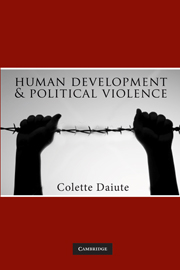Book contents
- Frontmatter
- Contents
- List of Figures
- List of Tables
- Preface
- 1 Beyond the Youth Gap in Understanding Political Violence
- 2 Youth and Society Work Together
- 3 Living History
- 4 Critical Narrating
- 5 Participation Matters
- 6 Sociobiographies
- 7 Human Development in Conflict
- Appendix: Examples of Public Stories across Positions in the DSTY Research Workshop
- References
- Index
7 - Human Development in Conflict
Published online by Cambridge University Press: 05 June 2012
- Frontmatter
- Contents
- List of Figures
- List of Tables
- Preface
- 1 Beyond the Youth Gap in Understanding Political Violence
- 2 Youth and Society Work Together
- 3 Living History
- 4 Critical Narrating
- 5 Participation Matters
- 6 Sociobiographies
- 7 Human Development in Conflict
- Appendix: Examples of Public Stories across Positions in the DSTY Research Workshop
- References
- Index
Summary
Play is important in development, especially in contexts of political violence, instability, and limited resources (Hyder, 2005). One group of scholars pointed out that for adolescents, their “‘toys’ are world affairs” (Winnicott et al., 1989, p. 62). As though agreeing with this claim, participants in our study across the former Yugoslavia indicated in numerous ways that they were ready to play. These young people know that world affairs are serious and deadly, but with support they are ready to consider how life could be better. Youth across the former Yugoslavia use discourse critically and creatively to respond to political violence in the research workshop and maybe for their own purposes. As in the drawing in Figure 7.1, participants generated novel meanings in their activities. “Peace through education” is an intriguing idea related to the workshop, although the research purpose was to learn from participants rather than to teach them.
Analyses in this book show how young people use cultural tools to mediate their understandings of each challenging context and how they fit within it. Participants' uses of activities indicate the promise of a developmental approach that broadens from assuming trauma or deficits to one that invites imagination. We have seen how adolescents and young adults, play, for example, with literature, letters to public officials, and other challenging activities to take advantage of their psychosocial powers to play. Playing imposes a sense of order in chaotic environments.
- Type
- Chapter
- Information
- Human Development and Political Violence , pp. 224 - 256Publisher: Cambridge University PressPrint publication year: 2010



